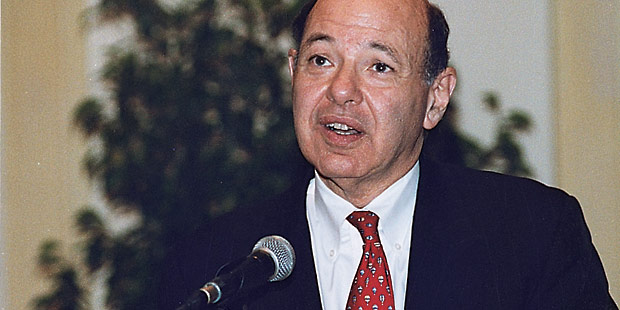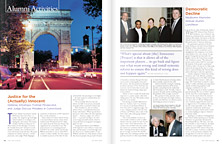Democratic Decline
Neuborne Keynotes Annual Alumni Luncheon
Printer Friendly Version“We live in a time of democratic decline,” began NYU School of Law Professor Burt Neuborne, one of America’s top scholars in constitutional law, procedure, and evidence. His remarks, the keynote at the Law School’s Annual Alumni Luncheon, examined the current state of American democracy.
In a passionate expression of his life’s work, Neuborne, the John Norton Pomeroy Professor of Law, detailed ways in which some of our country’s weaknesses can be strengthened. One symptom of our democratic decline is low voter turnout, he suggested. Noting that less than half of all eligible voters in the United States actually vote, Neuborne warned, “The democratic process cannot sustain itself if it cannot get the majority of the people to participate.” Neuborne made a strong case for improving turnout by moving election day to a weekend or a national holiday, like Veterans Day, and by allowing for same-day registration.
Another symptom of democratic decline, Neuborne said, is the difficulty candidates face in gaining access to the ballot and raising the money needed to mount a viable campaign. The United States is ruled by “super-citizens,” wealthy individuals and corporations capable of influencing legislation with campaign contributions, he said.
The third symptom of decline is political gerrymandering. The way in which Congress and the states have created legislative districts “sets the winner before the election,” Neuborne said. Noting a 98 percent reelection rate in the U.S. House of Representatives, Neuborne argued that the system is so rigged in favor of incumbency that seats become nearly impossible to lose. These symptoms of democratic decline keep Neuborne striving for reform and he vowed to continue fighting to improve America’s democratic health.
Speaking to an audience of distinguished Law School alumni spanning seven decades, Neuborne was graciously introduced by Dean Richard Revesz. The dean, who said he would like to clone Neuborne, described Neuborne as an exemplar of the kind of quality educators NYU School of Law has been able to attract. Neuborne recalled his service on the personnel committee that brought Revesz to the Law School, and shared the faculty’s pride in the dean’s rapid rise to national prominence. In attendance at the luncheon were two stalwarts, Rebecca Rolland (’23) and Herbert Hirschhorn (’32, J.S.D. ’34), as well as younger graduates, including recently elected New York State Assemblyman Jonathan Bing (’95).
The lecture was well received by attendees, and several alumni asked the professor questions after his formal remarks concluded. “This keeps me connected to NYU,” said Mansur Nuruddin (’00), an associate at Cravath, Swaine & Moore. “I really enjoyed the lecture. It was extremely interesting. And, it’s great to see early graduates who are still participating in the life of the Law School.”
Neuborne, a recipient of the University’s Distinguished Teaching Award who served as national legal director of the American Civil Liberties Union, works on issues concerning access to justice, fair courts, voting rights, and criminal justice reform as legal director of the Law School’s Brennan Center for Justice. He also is co-counsel to Senators John McCain and Russell Feingold in their defense of the Bipartisan Campaign Reform Finance Act. Described by Stuart Eizenstat, the leader on Holocaust-era issues as special representative of the president and secretary of state during the Clinton administration and currently a partner at Covington & Burling, as “the indispensable person” in both the Swiss and German Holocaust litigation, Neuborne serves as court-appointed lead settlement counsel in the litigation surrounding the involvement of Swiss banks in the Holocaust. He also is one of two U.S. appointees on the board of trustees of the $5.2 billion German Foundation “Remembrance, Responsibility, and the Future,” designed to provide compensation to Holocaust victims.


 Multimedia
Multimedia